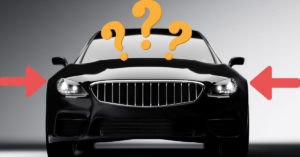Driving can be a noisy experience, with tire roar often being one of the most intrusive sounds. For many drivers, a quiet ride is a top priority when choosing new tires.
Tires are not just about grip and safety; they also contribute to the acoustic comfort inside the car.
According to Les Schwab Tire Center, tire noise reduction is a science, and designers have figured out how to tune tread patterns to change the harmonics and disrupt airflow, thereby reducing road noise.
This comprehensive guide will explore the leading technologies engineers use to design whisper-quiet tires.
You’ll discover which features create that coveted hushed ride, see how advanced compounds and constructions mute noise at the source, and compare today’s top-rated low-noise tires experts recommend.
Whether you seek serenity from your daily commute, long highway journeys, or off-road adventures, we will uncover how the latest innovations from respected brands like Michelin and Bridgestone remove unwanted vibrations and disturbances.
You’ll even find budget-friendly options that don’t compromise on comfort.
Learn how specialized tread patterns, sound-absorbing materials, stiffness optimization, and next-gen testing result in the quietest tires on the market.
With safety, performance, and your sanity in mind, let’s delve into the methods and technologies that bring tranquility to any ride.
Table of Contents
What Causes Tire Noise?
Before diving into the quietest tires technologies, let’s first understand what causes tires to make noise in the first place.
There are a few key factors:
Tread Pattern
The design of the tire tread plays a significant role in noise levels.
- How the tread blocks are shaped and spaced can determine the pitch and volume of noise produced.
- Tires with large, heavily spaced blocks tend to be noisier as air gets trapped and compressed between the blocks.
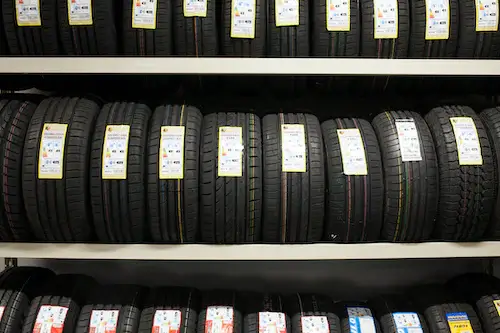
Tread Compound
The actual rubber compound used in the tread also impacts noise.
- Harder compounds generally produce more noise than softer, more malleable compounds.
- However, softer treads compromise on traction and wear life. Finding the right balance is key.
While focusing on quietness is essential, it’s also crucial to understand the risks associated with poor tire choices.
For instance, driving on a flat tire can be hazardous; learn more about it to avoid such risks.
Tire Construction
A tire’s internal structure can also contribute to noise.
- The number and type of plies, the bead design, and other construction factors can affect vibration and noise generation.
Road Surface
The characteristics of the road surface itself are a huge factor.
- Rougher, coarser surfaces produce far more tire noise than smooth asphalt or concrete. Grooved or broken pavement is especially noisy.
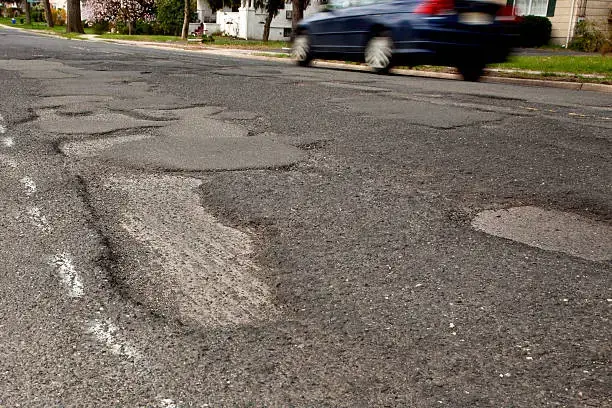
Vehicle Factors
Elements like wheel size, suspension design, vehicle load, and speed can amplify tire noise if not properly controlled.
- Larger wheels with lower-profile tires tend to be louder.
For those who own luxury SUVs and are seeking the pinnacle of quiet and comfort, explore our best 5 options for the most quiet luxury SUVs.
Technologies Behind the Quietest Tires
Understanding the root causes of tire noise allows manufacturers to develop innovative technologies to reduce it.
Here are some of the top technologies found in the quietest tires today:
Michelin’s Pitch Sequence Design: An Overview
Michelin’s pitch sequence design is an innovative approach to tire engineering that focuses on varying the size and angle of tread blocks around the tire’s circumference.
This design aims to disrupt the uniformity of noise frequencies generated during the tire’s contact with the road, thereby reducing the droning effect commonly associated with tire noise.
Key Features
- Varying Tread Blocks: The design incorporates tread blocks of different sizes and angles strategically placed around the tire.
- Noise Reduction: By breaking up the uniformity of noise frequencies, the design minimizes the droning noise that can be annoying and fatiguing to drivers and passengers.
- Enhanced Performance: While the primary goal is noise reduction, the varying tread blocks can also contribute to better grip and handling, especially on wet surfaces.
Bridgestone’s Resonance Attenuating Sipes: A Closer Look
Bridgestone employs a unique tire design feature called “resonance attenuating” sipes. These are thin, groove-like slots carved into the tire’s tread blocks.
The primary function of these sipes is to trap and cancel out noise generated during driving, thereby contributing to a quieter ride.
Key Features
- Noise Cancellation: The sipes work by trapping air and using it to cancel out the noise generated by the tire’s contact with the road.
- Enhanced Comfort: These sipes contribute to a more comfortable driving experience by reducing road noise.
- Additional Traction: While the primary focus is noise reduction, sipes can improve traction, particularly on wet or icy roads.
Goodyear’s 3D Active Technology Blocks: An In-Depth Look
Goodyear employs a unique tire design feature known as 3D Active Technology blocks.
These specially contoured or curved tread blocks are designed to manage airflow and pitch, effectively reducing tire noise.
Key Features
- Swept, Interlocking Blocks: The design incorporates swept, interlocking tread blocks engineered to reduce noise by better managing airflow and pitch.
- Noise Reduction: The 3D Active Technology blocks work by altering the airflow around the tire, reducing the noise generated during driving.
- Enhanced Performance: While the primary focus is noise reduction, the unique block design can improve grip and handling.
Yokohama’s Silent Shoulder Technology: An Insightful Look
Yokohama employs a unique feature called “Silent Shoulder” technology in their tires.
This technology uses an angular shoulder design to mitigate noise at the tire edge, contributing to a quieter driving experience.
Key Features
- Angular Shoulder Design: The technology incorporates an angular design at the tire’s shoulder, engineered to reduce noise.
- Noise Mitigation: The Silent Shoulder manages the airflow around the tire edge, reducing the noise generated during driving.
- Enhanced Comfort: This technology contributes to a more comfortable driving experience by reducing road noise.
Pirelli’s Sound Absorbing Technology: A Comprehensive Look
Pirelli employs their tires’ unique feature, the Pirelli Noise Cancelling System™ (PNCS). This technology uses a sound-absorbing device applied to the inside circumferential wall of the tire, reducing noise by half.
The system can resolve what is known as “cavity noise,” which is generated in the tire structure and inside the car.
Pirelli’s sound-absorbing sponge reduces the frequency filtering through the car, providing superior comfort compared to traditional tires.
The PNCS reduces noise between two or three decibels, which reduces the perceived noise by half on average.
Key Features
- Sound Absorbing Device: The technology incorporates a sound-absorbing device engineered to reduce noise that is applied to the inside wall of the tire.
- Noise Mitigation: The PNCS absorbs vibrations generated in the tire structure, reducing the noise transmitted to the cabin.
- Enhanced Comfort: This technology contributes to a more comfortable driving experience by reducing road noise.
Tread Compounds: Silica-Infused Natural Rubber for Quieter Rides
Specific tread compounds like silica-infused natural rubber are another innovative approach to reducing tire noise.
These compounds can produce a quieter tread surface than harder ones while maintaining an excellent wet grip.
Key Features
- Silica-Infused Natural Rubber: This compound is engineered to reduce noise by providing a softer, quieter tread surface.
- Noise Mitigation: The softer compounds work by reducing the vibrations generated on the road, thereby reducing noise.
- Wet Grip: Despite being softer and quieter, these compounds do not compromise on wet grip, ensuring safety in wet conditions.
For a detailed look at how leading tire brands leverage specialized compounds and other noise-reducing technologies specifically for SUV applications, check out our in-depth guide on the quietest SUV tires.
This review explores the top options across full-size, mid-size, compact, and luxury SUV categories.
Comfort Layer: Rubber-coated polyester for Dampening Vibrations
Including a “Comfort Layer” in some tires is another noteworthy innovation to reduce road noise and enhance ride comfort.
Check my detailed review about the best tires for comfort and noise.
This layer, typically made of rubber-coated polyester, is between the tread and the tire belts. Its primary function is to dampen vibrations generated when the tire touches the road.
Key Features
- Rubber-Coated Polyester: This material is specifically chosen for its ability to absorb vibrations, thereby reducing noise and enhancing ride comfort.
- Noise Mitigation: The comfort layer dampens the vibrations generated during driving, reducing the noise that reaches the vehicle’s cabin.
- Enhanced Comfort: This layer contributes to a smoother, more comfortable driving experience by mitigating vibrations.
Sidewall Treatment: Optimizing Stiffness for Noise Reduction
Treating the sidewall in tire design is another area where manufacturers aim to reduce noise and enhance ride comfort.
Manufacturers can effectively reduce noise-causing vibrations by optimizing the sidewall’s stiffness through specific numbers of plies and compounds.
Key Features
- Optimized Stiffness: The sidewall is engineered to have an optimized level of stiffness, which is achieved through carefully selecting plies and compounds.
- Noise Mitigation: The optimized stiffness reduces the vibrations generated when the tire contacts the road, thereby reducing noise.
- Enhanced Comfort: The optimized sidewall contributes to a more comfortable driving experience by reducing vibrations.
Reduced Ribbing: Minimizing Pattern Noise Through Tread Design
Reduced ribbing in tire design is another innovative approach to minimizing “pattern noise” generated by the tire’s tread pattern.
Manufacturers can reduce this noise by minimizing continuous tread ribs in favor of blocks or sipes.
Key Features
- Minimized Continuous Ribs: The design incorporates fewer continuous tread ribs, opting instead for blocks or sipes to reduce pattern noise.
- Noise Mitigation: The reduced ribbing alters the tread pattern, which minimizes the noise generated during driving.
- Enhanced Comfort: This design feature contributes to a quieter and more comfortable driving experience by reducing pattern noise.
Average Noise Level by Tire Type
| Tire type | Average noise level (dBA) |
|---|---|
| Grand touring tires | 68-70 |
| All-season tires | 69-71 |
| Performance tires | 70-72 |
| Winter tires | 71-73 |
Quietest Tires – Personal Experience
Here is a draft personal anecdote about my experience with tire noise:
I purchased a new 2020 Honda Insight hybrid fresh off the factory floor a few years back. Being a new car, it came installed with a set of Michelin tires touting an impressive 65,000-mile treadwear warranty.
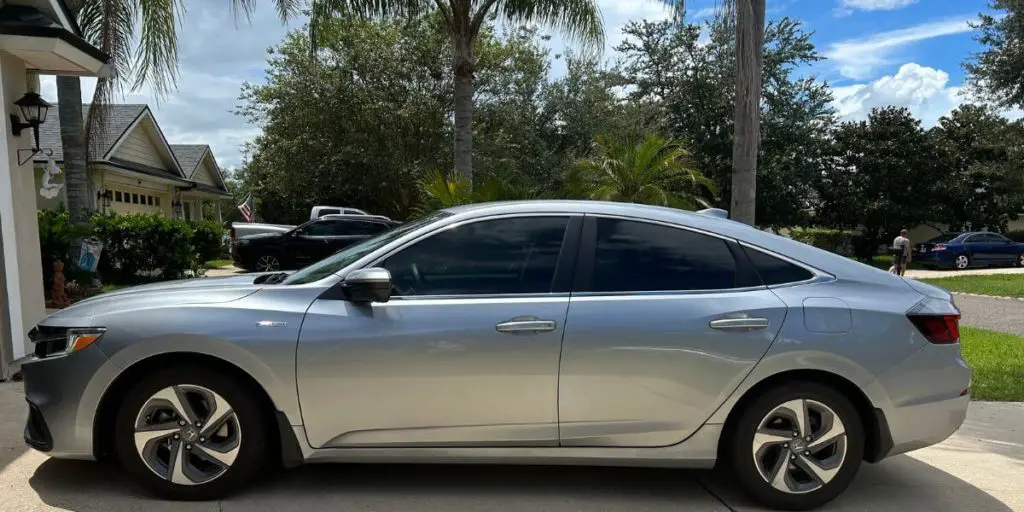
After driving on those original Michelins for around 60,000 miles, it came time to replace them.
To save money, I bought a cheaper set of off-brand tires instead of splurging for Michelin again. Big mistake. LOL
As soon as I installed the new tires, I immediately noticed a dramatic difference in ride quality and noise.
An obnoxious humming sound reverberated through the cabin, ultimately taking away from the previously serene driving experience I was accustomed to.
After countless headaches and complaints from passengers about the unbearable droning racket generated by the budget tires, I finally threw in the towel.
I bit the bullet and sprung for a new set of Michelins. It was like night and day. The tires were whisper quiet once again, and driving my Insight became enjoyable rather than annoying.
Based on my first-hand experience, the moral of this story is that quality tires, especially when it comes to noise reduction, are worth the extra investment.
While it’s tempting to cheap out and choose more affordable options, you truly get what you pay for when it comes to critical components like tires.
Some things like wiper blades or floor mats can be purchased at discounts without much sacrifice but my time with subpar tires taught me never to skimp on your ride’s footwear.
The comfort, safety, and serenity you’ll gain is priceless.
Quietest Tires by Noise Level
| Tire | Noise level (dBA) |
|---|---|
| Michelin Defender LTX M/S | 68.8 |
| Continental PureContact LS | 69.0 |
| Bridgestone Turanza QuietTrack | 69.2 |
| Yokohama Geolandar A/T G015 | 69.4 |
| Goodyear Assurance ComfortDrive | 69.6 |
| Pirelli P4 Four Seasons Plus | 69.8 |
| Hankook Kinergy GT | 70.0 |
| Firestone Precision Touring | 70.2 |
| Falken Ziex ZE950 | 70.4 |
| BFGoodrich Advantage T/A Sport | 70.6 |
| Cooper Zeon RS3-A | 70.8 |
The Quietest Tires You Can Buy Today
Now that we’ve covered the key technologies manufacturers use to create quiet tires let’s look at some of the top-rated quietest tires models you can buy today based on expert tests and owner reviews:
1. Bridgestone Turanza QuietTrack: Where Silence Meets Superior Traction
Key Features
- Lowest Noise Levels: Engineered with cutting-edge noise-reducing technology, the Bridgestone Turanza QuietTrack promises a ride that’s noticeably quieter than its tire counterparts in the market.
- Excellent Dry and Wet Traction: This tire doesn’t compromise on traction. It delivers superior grip, whether navigating dry highways or rain-soaked roads, ensuring your driving experience is safe and smooth.
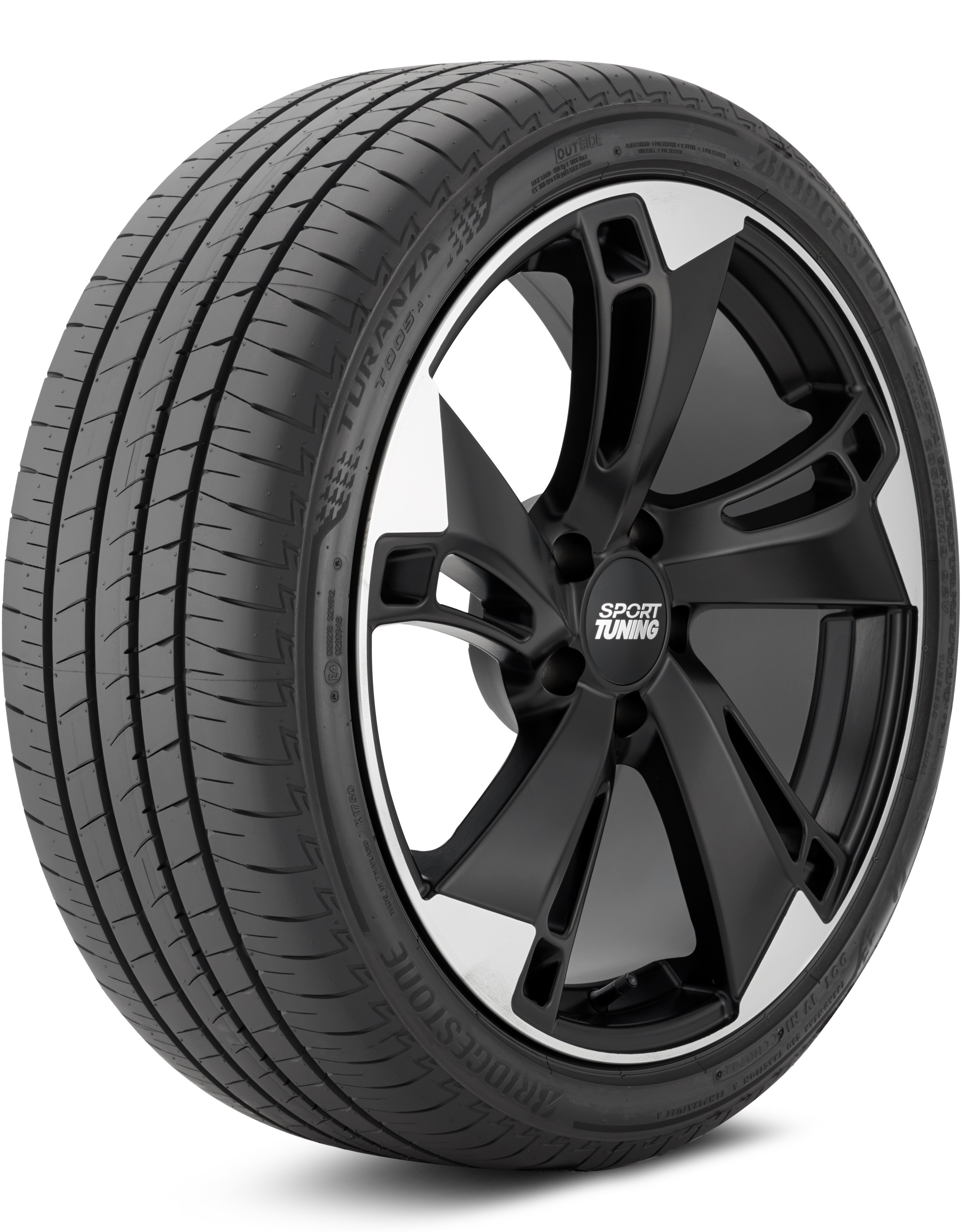
Best For
- Daily Commuting: If your daily routine involves commuting, and you yearn for a tire that offers a quiet and comfortable ride, look no further than the Bridgestone Turanza QuietTrack.
- Long Drives: Planning a road trip? This tire’s durability and comfort make it an excellent choice for extended journeys.
If you own an SUV and want the ultimate peaceful ride, don’t miss our comprehensive guide on the Quietest SUVs.
Additional Info
- Usable in Light Snow: While it may not bear the title of a winter tire, the Bridgestone Turanza QuietTrack showcases reasonable performance in light snow conditions, providing you with added peace of mind during winter.
Pros and Cons
| PROS | CONS |
|---|---|
| Low Noise Levels | Slightly Expensive |
| Excellent Dry and Wet Traction | Not Ideal for Heavy Snow |
| Durable and Long-lasting |
Expert Opinion
The Bridgestone Turanza QuietTrack is a standout with its noise-reduction technology and exceptional traction. It’s the go-to choice for those seeking a versatile and dependable tire.
2. Bridgestone Turanza Serenity Plus: Where Silence Meets Performance
Key Features
- Lowest Noise Levels: Crafted with cutting-edge noise-reducing technology, the Bridgestone Turanza Serenity Plus takes pride in offering a remarkably hushed ride, outperforming many other tires in the market.
- Exceptional Dry Performance: When it comes to dry conditions, this tire shines brightly, delivering outstanding grip and traction for your everyday driving needs.
Best For
- Daily Commuting: Tailored for those who embark on daily commutes and prioritize a serene and comfortable journey.
- Short Braking Distances: This brings you the advantage of shortened braking distances, bolstering safety across diverse driving conditions.
Additional Info
- Wet Weather Handling: While it may not claim the crown in torrential downpours, it is a dependable choice for maintaining grip and traction in typical wet conditions.
- Snow Performance: In light snow conditions, it steps to the plate, offering satisfactory traction on shallow and unpacked snow-covered roads.
| PROS | CONS |
|---|---|
| Low Noise Levels | Not Ideal for Heavy Snow |
| Exceptional Dry Performance | Handling May Be Average |
| Short Braking Distances | May Not Be as Competitive in Heavy Rain |
| Reliable Wet Weather Handling | |
| Usable in Light Snow |
Expert Opinion
The Bridgestone Turanza Serenity Plus is a champion for delivering a serene and comfortable ride backed by exceptional dry performance.
While it may not be your go-to choice for heavy snow or intense rain, it’s a dependable companion for your daily driving needs.
3. Michelin Primacy MXV4: Where Precision Meets Comfort
Key Features
- Precise Handling: Trusted by numerous high-end car manufacturers as an OEM tire, the Michelin Primacy MXV4 is celebrated for its exceptional ability to deliver precise handling, guaranteeing a smooth and supremely comfortable journey.

- Helio Compound: This tire boasts a premium proprietary compound infused with a substantial dose of sunflower oil. It thrives in all weather conditions, maintaining outstanding traction even on icy and snow-covered surfaces.
- Primacy Comfort Control Technology: Armed with meticulously designed treads and a proprietary manufacturing process, the Primacy MXV4 earns its reputation as one of the industry’s quietest and least vibration-prone tires.
| PROS | CONS |
|---|---|
| Superior Responsiveness | Limited Warranty |
| Good Traction on Various Surfaces | Not Ideal for Heavy Snow Conditions |
| Outstandingly Stable Driving Experience | |
| Comfort Control Technology for a Quiet Ride |
Expert Opinion
The Michelin Primacy MXV4 epitomizes the perfect blend of precise handling, exceptional traction, remarkable stability, and a serene, comfortable ride.
While its warranty might not steal the spotlight, its performance unquestionably shines.
4. Continental PureContact LS: Where Touring Meets Tranquility
Key Features
- Touring Excellence: Continental crafted the PureContact LS to stand proudly among top-tier touring tires, competing head-to-head with renowned brands such as Michelin, Goodyear, and Bridgestone.
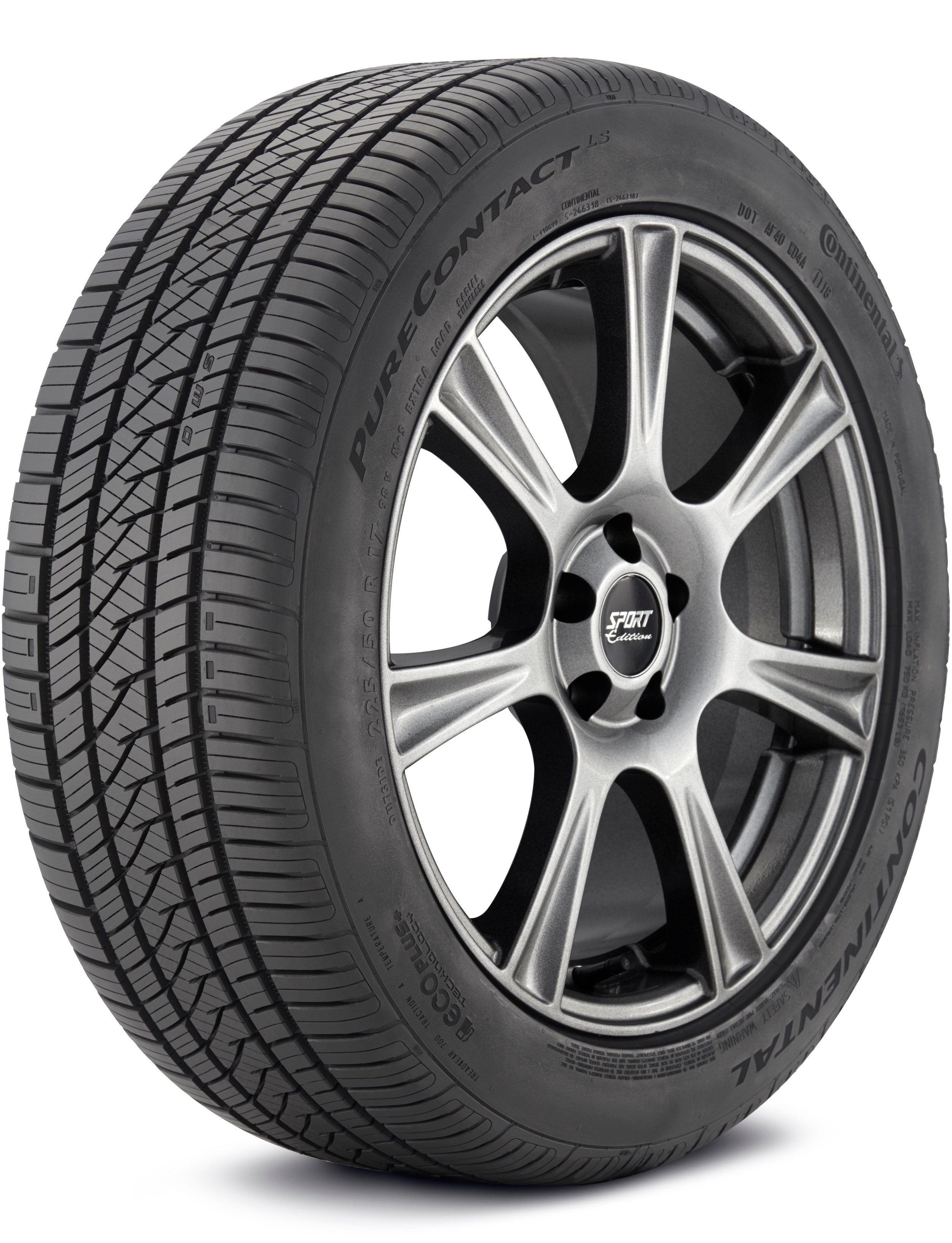
- Advanced Compound: This tire showcases a special compound enriched with a polymer, elevating bonding strength, wear resistance, and fuel efficiency. The addition of Sylane as an additive further enhances its gripping prowess.
- Asymmetrical Tread Design: An asymmetrical tread design embraces the road with remarkable horizontal grip on various surfaces, ensuring unwavering stability, even at exhilarating high speeds.
- Large Central Rib: Including a substantial central rib amplifies controllability, transforming highway driving into a seamless and harmonious experience.
- Traction Enhancements: Traction grooves and intermediate tread blocks collaborate to boost traction, substantially delivering confident performance on diverse terrains.
- Exceptional Quietness: The Continental PureContact LS claims its throne among the quietest touring tires available, promising a serene driving experience, even when pushing the boundaries of speed.
| PROS | CONS |
|---|---|
| Enduring Performance | Not suitable for off-road adventures |
| Advanced Tire Compound | |
| Stable and Comfortable Driving | |
| Improved Traction | |
| Exceptional Quietness |
Expert Opinion
The Continental PureContact LS epitomizes excellence in the world of touring tires, surpassing expectations with its enduring performance, stability, and remarkable quietness.
While it may not be your partner for off-road escapades, it is the top choice for those seeking the utmost comfort and serenity during highway journeys.
5. Michelin Premier LTX: Where Silence Meets Superiority
Key Features
- Buttery Smooth Ride: If you seek serenity, the Premier LTX from Michelin delivers. This tire offers a buttery smooth ride, gliding effortlessly over the most rugged terrain. Its commitment to silence is evident, making it one of the quietest tires available today.
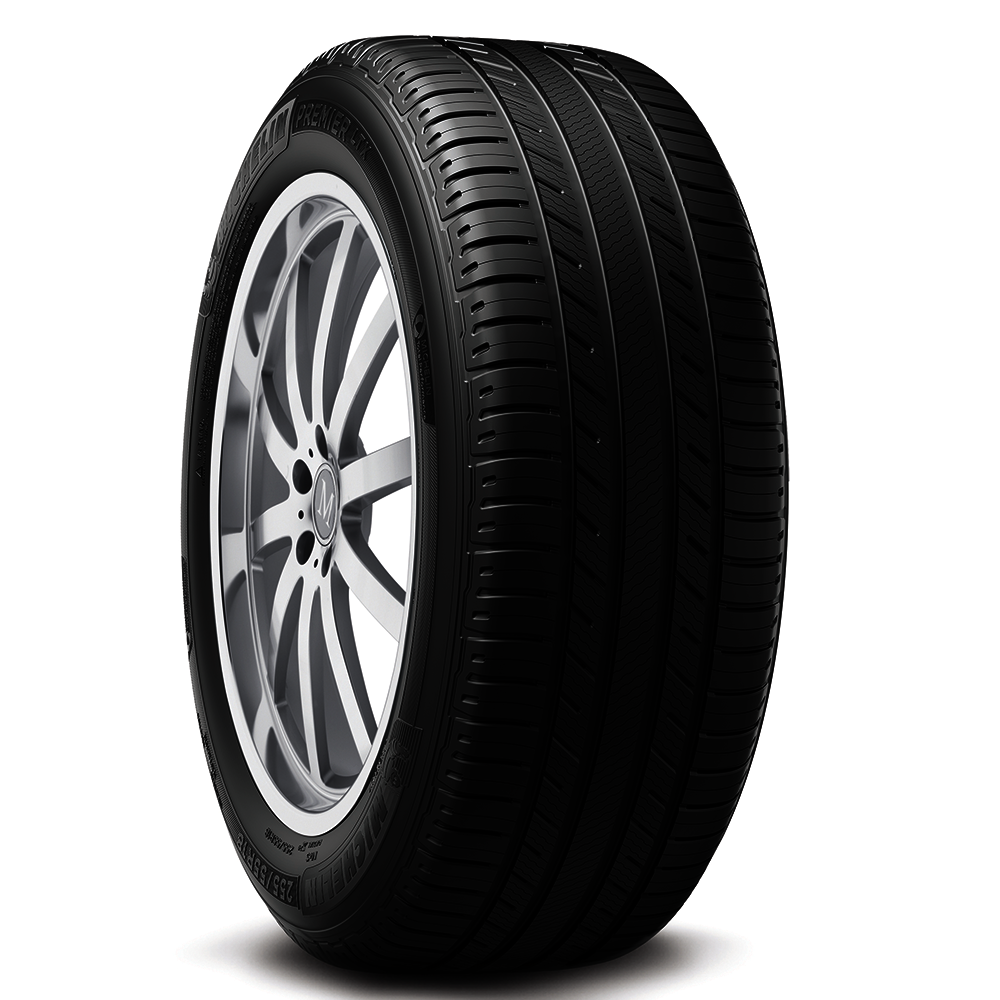
- Excellent Dry and Wet Traction: Michelin masterfully combines comfort with exceptional dry and wet traction. Regardless of the road conditions, this tire proves its mettle, offering confidence and control with every turn.
- Balanced Handling: Like a well-conducted orchestra, the Premier LTX demonstrates balanced handling, ensuring predictable behavior even when pushed to its limits. It harmonizes with the road, providing a symphony of control.
- Winter Performance: Winter’s chill is no match for this tire’s capabilities. It offers reliable snow traction and simplifies winter driving, making it a versatile choice throughout the year.
- Treadwear Warranty: Michelin stands behind its creation with a 60,000-mile treadwear warranty. While not the most extravagant, it remains highly respectable within its category, a testament to its enduring quality as attested by satisfied owners.
| PROS | CONS |
|---|---|
| Outstanding grip in dry conditions | Treadwear warranty slightly falls behind the curve |
| Great handling on wet roads | |
| Surefooted handling on snow-covered roads | |
| Good and quiet at highway speeds | |
| Smooth, controlled ride across most surfaces |
Expert Opinion
The Michelin Premier LTX is a testament to Michelin’s dedication to providing a serene, controlled, and comfortable ride for SUVs and crossover owners.
If you’re interested in a peaceful drive, don’t miss our guide on the best 5 proven options for the quietest compact SUV.
Its blend of comfort with exceptional traction in dry and wet conditions makes it a well-rounded choice.
While the treadwear warranty may not break records, its owners’ reliability and satisfaction speak volumes.
6. Michelin Defender LTX M/S: Where Strength Meets Serenity
Key Features
- Smooth and Quiet Ride: The Defender LTX M/S from Michelin is a heavyweight champion designed for robust tasks like towing hefty trailers and transporting substantial cargo. Remarkably, it delivers a smooth ride over bumps and maintains a hushed demeanor even at highway speeds.
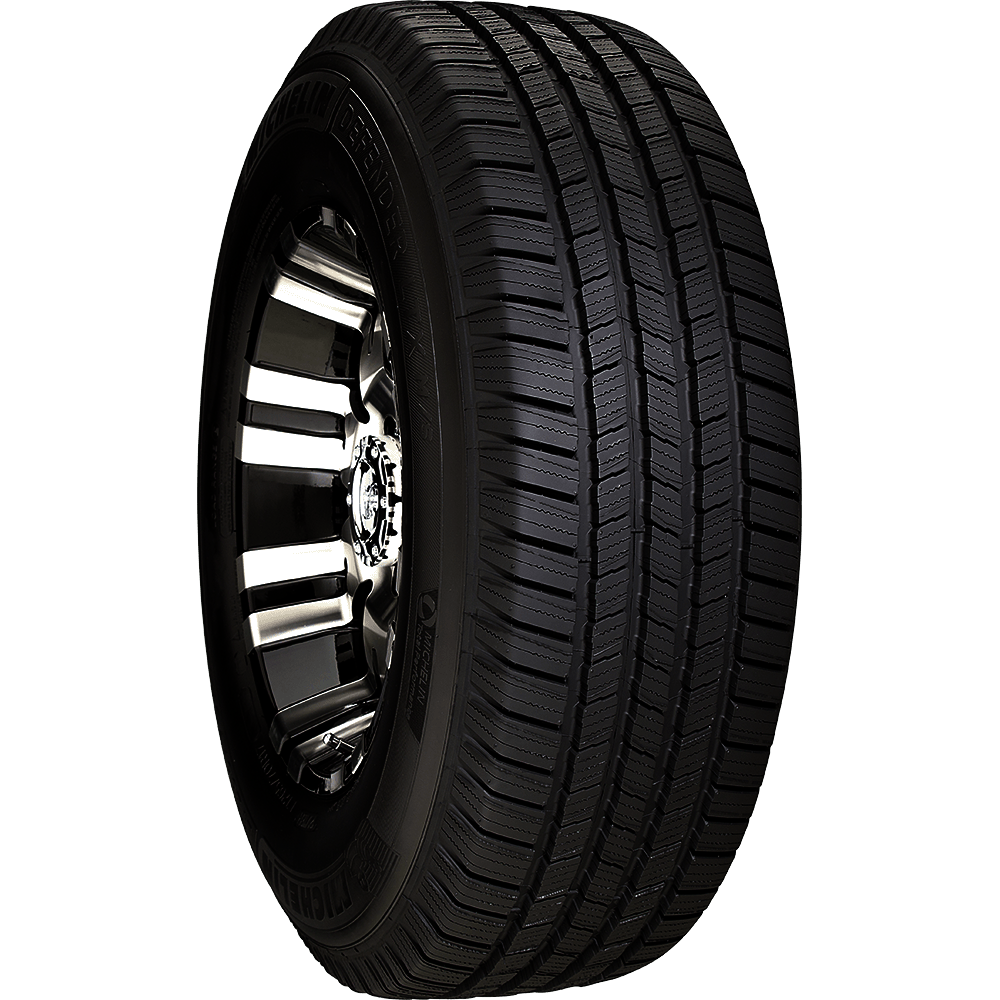
- Outstanding Traction: As expected from the Michelin lineage, this tire excels in traction across a spectrum of surfaces, ensuring you’re never left wanting for grip.
- Best-in-Class Wet Handling: Wet handling prowess places this tire among the elite in its category, characterized by formidable braking capabilities and commendable lateral grip, even in drenching rain.
- Excellent Dry Grip: Its dry grip is nothing short of impressive, ensuring unwavering stability and control, particularly when it matters most.
- Snow Traction: Winter’s challenges are met head-on, as this tire provides ample snow traction, delivering the confidence you need when navigating wintry landscapes.
- Exceptional Durability: Numerous tests and satisfied owners attest to this tire’s unrivaled durability within its category. Michelin backs this reputation with an impressive 70,000-mile treadwear warranty.
| PROS | CONS |
|---|---|
| Pros | Cons |
| Excellent wet traction and drivability | Considered a premium-priced option |
| High traction and cornering grip on dry roads | |
| Solid traction on light snow | |
| Stable on the highway, especially when towing | |
| Reasonably smooth ride for a highway tire | |
| Extraordinarily long tread wear warranty |
Expert Opinion
The Michelin Defender LTX M/S is the pinnacle choice for those who demand excellence from their heavy-duty trucks and SUVs.
It deftly combines the grace of a smooth, quiet ride with unyielding traction across diverse terrains.
Its wet handling prowess is unrivaled, and even in light snow, it maintains its poise. While it may bear a premium price tag, its remarkable durability and extensive treadwear warranty render it a wise investment.
7. Continental TerrainContact H/T: Where Every Road Becomes a Smooth Journey
Key Features
- Improved Snow Performance: The TerrainContact H/T effortlessly conquers snow-covered roads, boasting superior acceleration traction and remarkable braking, leaving rivals in the dust.
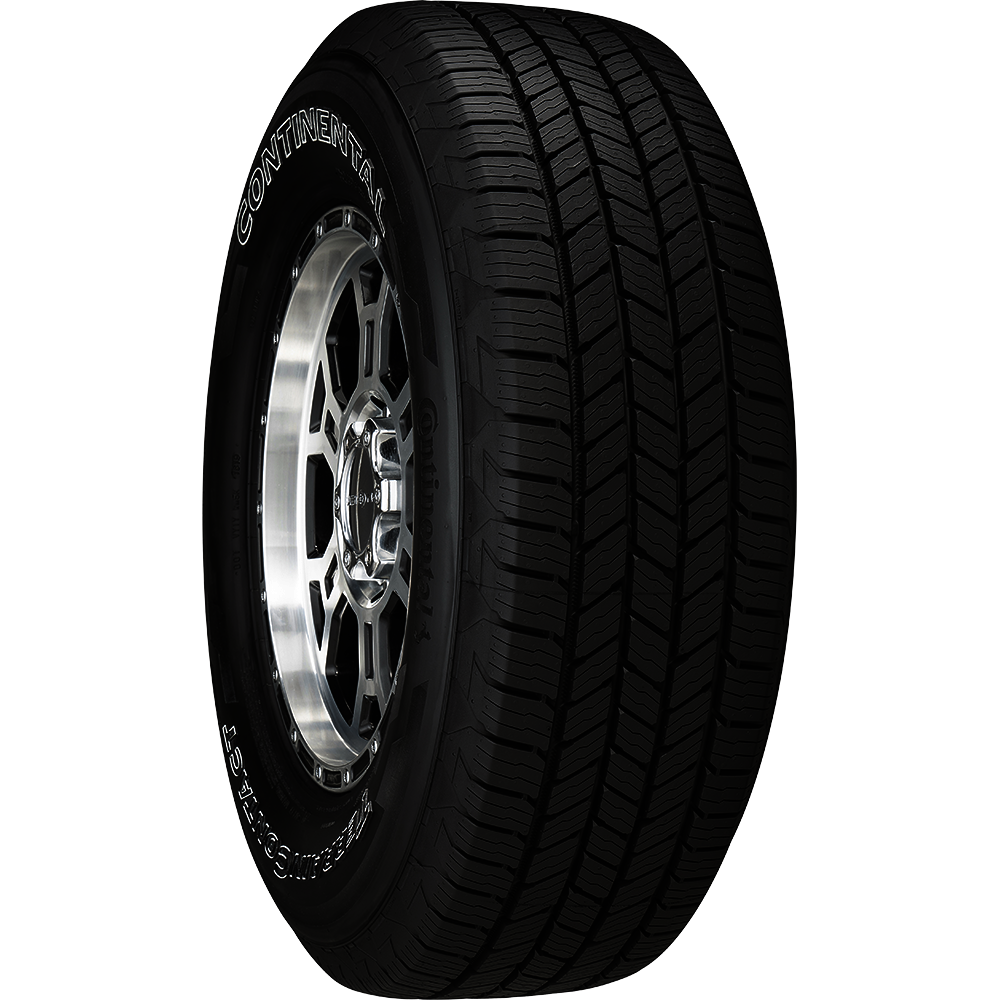
- Rain Benchmark: As a premier highway all-season tire, it sets a new standard for rain performance. With impeccable braking, elevated lateral grip, and unwavering surefooted handling, it makes every rainy day a breeze.
- Impressive Dry Traction: This tire redefines dry traction expectations for a highway tire, though a hint of vagueness in the steering may be its only slight imperfection.
- Exceptional Comfort: Comfort reigns supreme with the TerrainContact H/T, featuring unrivaled tranquility achieved through remarkably low noise levels and a luxuriously smooth ride, even on rough terrain.
- Generous Treadwear Warranty: Continental’s commitment to longevity shines through with an extraordinary 70,000-mile treadwear warranty for Euro-metric sizes and an equally impressive 60,000-mile warranty for LT-metric sizes, effortlessly surpassing category expectations.
| PROS | CONS |
|---|---|
| Best-in-class braking on wet pavement | Steering may lack precision for some |
| Outstanding grip in the rain | May pose a higher cost for some |
| Outstanding grip and traction on dry roads | Not optimized for off-roading |
| Good traction on ice (all-season tire) | |
| Very low noise levels, even on rough patches | |
| Extensive tread wear warranty |
Expert Opinion
The Continental TerrainContact H/T stands tall as an extraordinary highway all-season tire, gracefully mastering snow, rain, and dry conditions.
Its exceptional comfort offers serenity with minimal noise and a silky-smooth ride.
While some may desire sharper steering, it remains a top choice for those pursuing the segment’s finest braking and wet performance.
8. Yokohama Geolandar A/T G015: Where Tranquility Meets All-Terrain Tenacity
Key Features
- Quiet All-Terrain Performance: The Geolandar A/T G015 strikes the perfect chord between all-terrain capability and peaceful travel. It generates a mild hum, slightly louder than a highway all-season tire but remarkably hushed compared to most all-terrain counterparts.
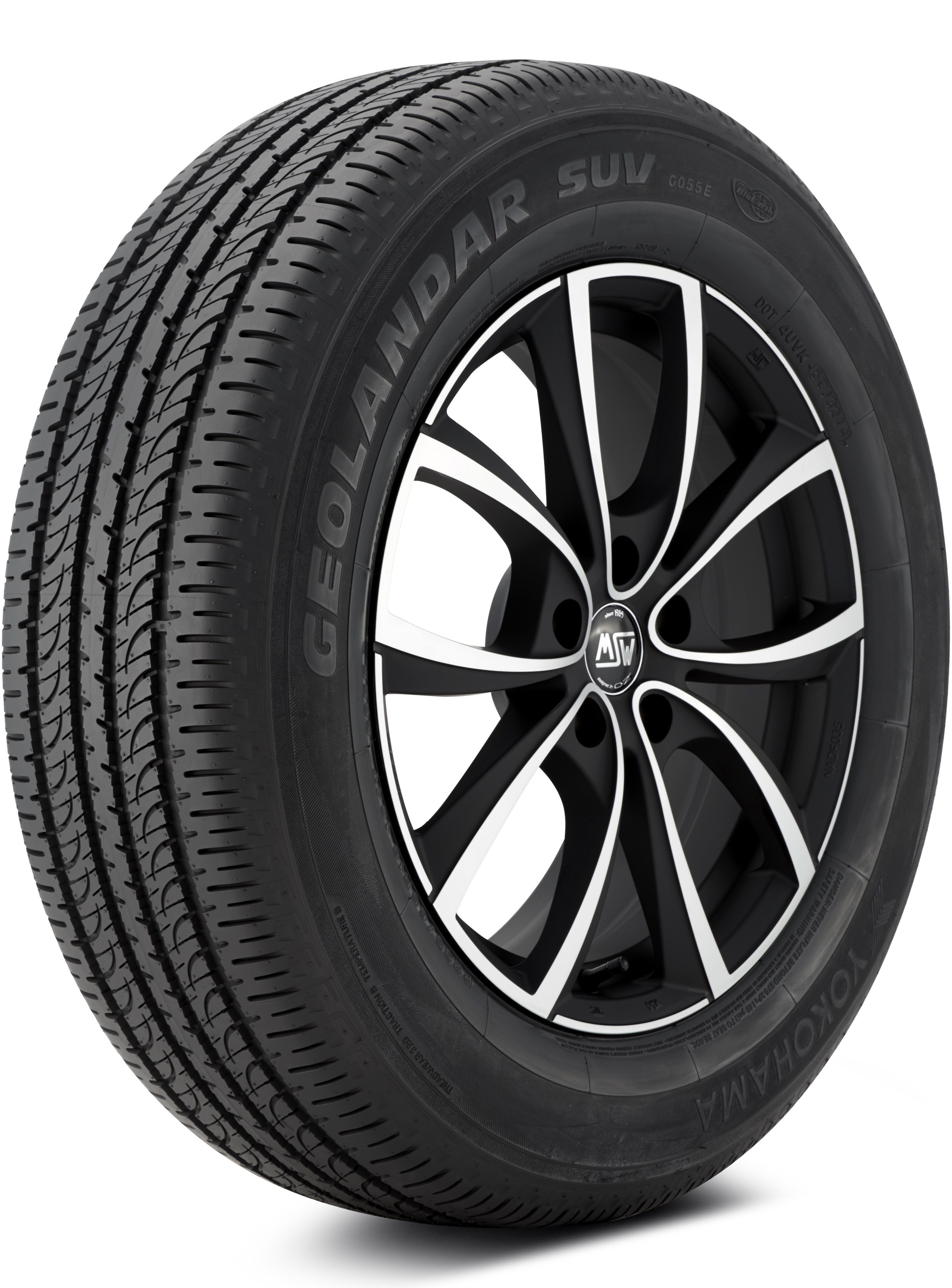
- Capable Off-Road: This tire’s true prowess shines on dirt roads and proves adept on diverse terrains such as turf, gravel, and sand.
- On-Road Versatility: On-road traction remains excellent regardless of the weather’s disposition. It boldly competes with the finest all-terrain tires, delivering an exceptional driving experience.
- Impressive Snow Traction: When winter descends, the Geolandar A/T G015 rises to the occasion, providing superb snow traction, whether the ground is packed or pristine.
- Treadwear Warranty: To bolster your confidence, it comes fortified with a lengthy treadwear warranty, solidifying its reliability within the category.
| PROS | CONS |
|---|---|
| Very good grip and traction on dirt and gravel | Can be a touch harsh over repetitive impacts |
| Robust grip and braking | Mud traction below average |
| Proficient handling and braking in rainy conditions | |
| Secure traction and handling on light snow | |
| Serene and quiet ride |
Expert Opinion
The Yokohama Geolandar A/T G015 harmoniously merges off-road prowess with on-road serenity. It delivers a tranquil performance, excels on various terrains, and impresses with its snow-handling capabilities.
While it might exhibit some rigidity over repetitive impacts and isn’t designed for deep mud adventures, it is a reliable choice for those seeking quiet yet capable all-terrain tires.
9. Continental ExtremeContact DWS 06 Plus: Where Performance Meets Serenity
Key Features
- Quiet and Comfortable Performance: Continental strikes the perfect harmony between performance and comfort with the ExtremeContact DWS 06 Plus. It gracefully maintains a hushed demeanor at highway speeds while providing a plush ride over rough terrain.
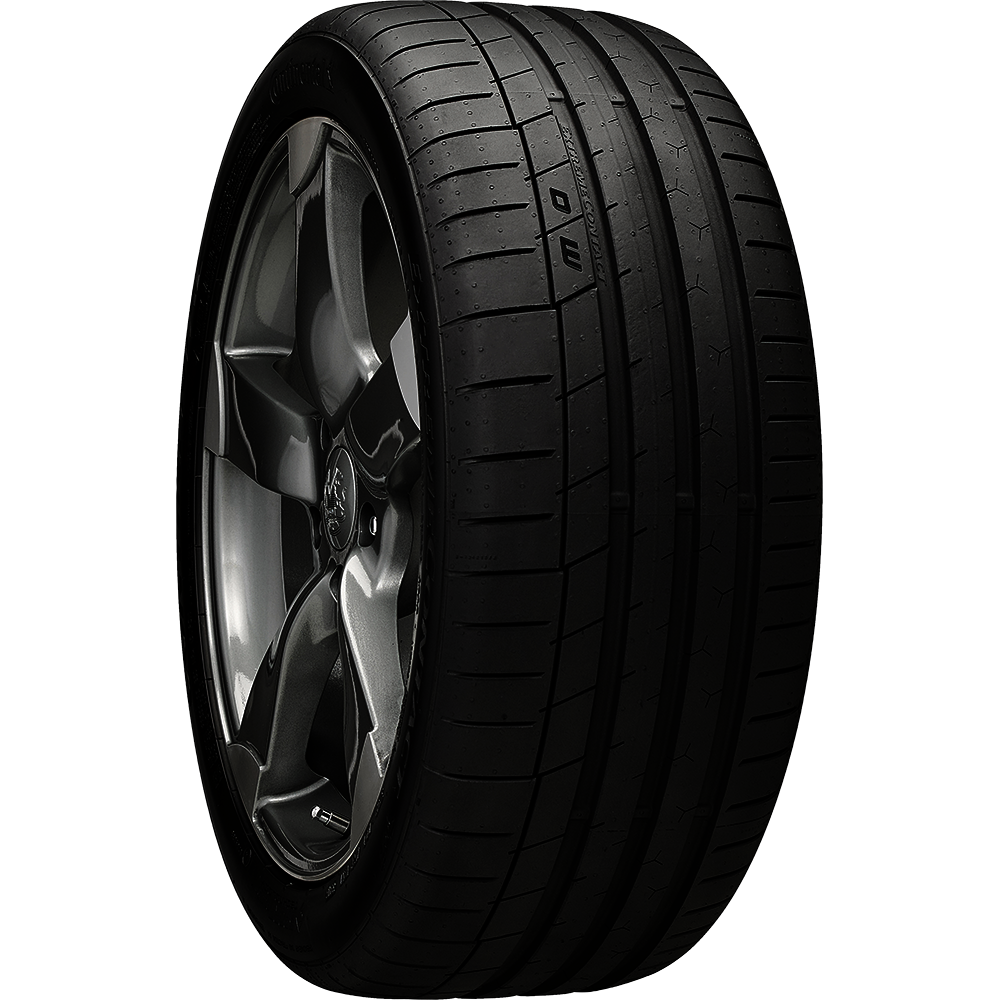
- Impressive Wet Performance: This tire excels when the skies open up, showcasing exceptional longitudinal traction and a firm grip on wet or dry pavement.
- Surprisingly Good Snow Performance: When winter’s grasp takes hold, the DWS 06 Plus rises to the occasion, delivering a commendable performance on snow-covered roads, defying expectations.
- Long Treadwear Warranty: Continental stands behind its creation with an ample 50,000-mile treadwear warranty, setting a high standard in the ultra-high-performance all-season category.
| PROS | CONS |
|---|---|
| Exceptional performance in rainy conditions | Steering responsiveness could be more immediate |
| High grip and balanced handling in dry conditions | |
| Very good traction on light snow | |
| Remarkable comfort for a performance tire | |
| Extended treadlife for prolonged enjoyment |
Expert Opinion
The Continental ExtremeContact DWS 06 Plus transcends the stereotype that performance tires must compromise comfort.
While it may have room for improved steering responsiveness, it thrives in wet conditions, dry handling, and even light snow.
Backed by a substantial treadwear warranty, it is a premier choice for those pursuing all-season performance without sacrificing serenity.
10. Vredestein Hypertrac All Season: Unveiling a Hidden Gem
Key Features
- Surprisingly Impressive Performance: While the Hypertrac All Season may not be the first choice for car enthusiasts, Vredestein has crafted a tire that exceeds expectations regarding grip and traction, delivering remarkable performance.
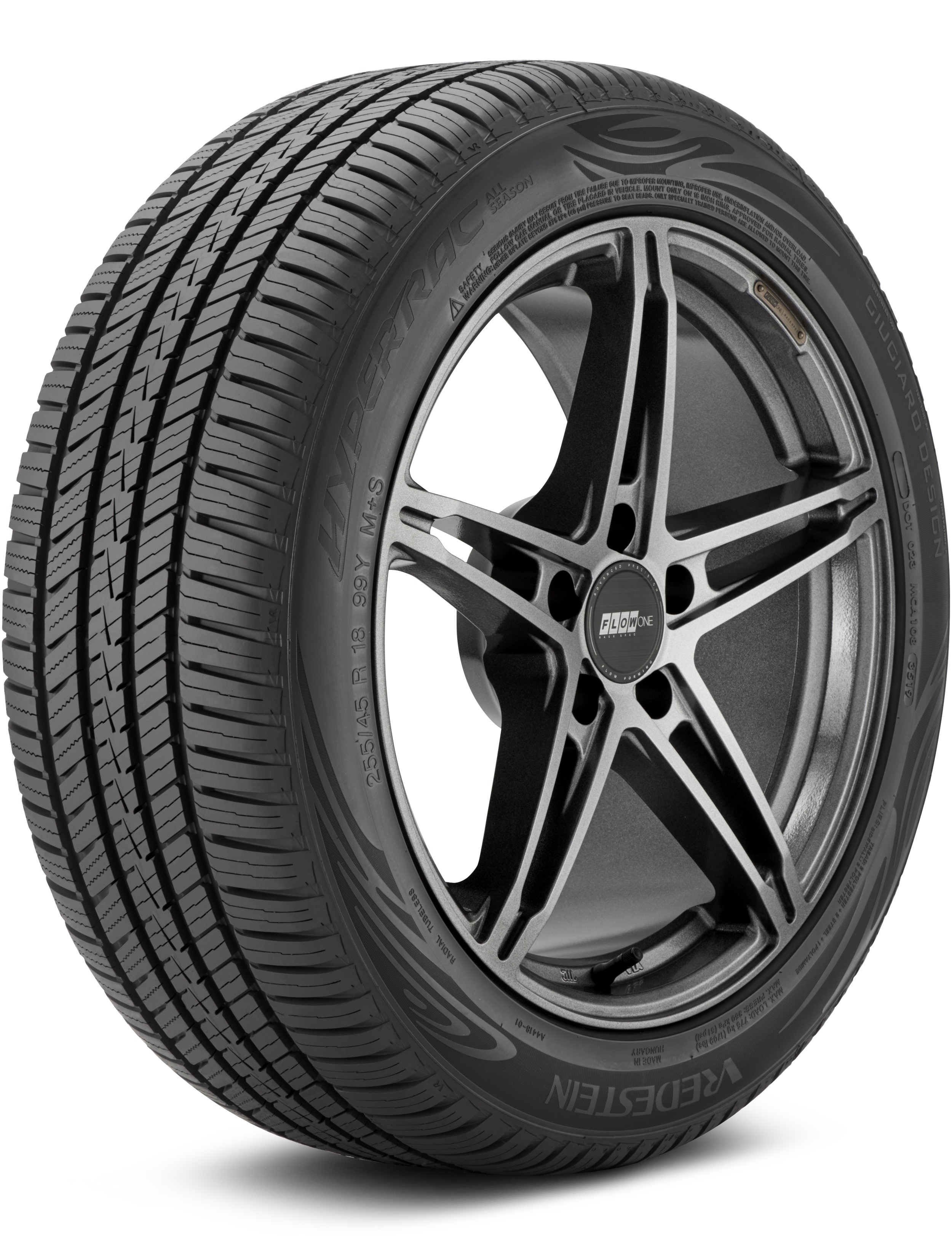
- Strong Wet and Snow Performance: This tire excels in wet conditions and emerges as a standout contender on snow-covered roads, showcasing its prowess in adverse weather.
- Quiet and Comfortable: Offering a serene and comfortable ride, even when navigating rough patches, the Hypertrac All Season approaches the refinement of a touring all-season tire.
- Budget-Friendly Brilliance: Despite its premium-level performance, this tire comes at a reasonable price point, making it an attractive option for those seeking value without compromise.
- Generous Treadwear Warranty: Vredestein backs this tire with an impressive 50,000-mile treadwear warranty, a testament to its durability and long-lasting performance, particularly considering its affordability.
| PROS | CONS |
|---|---|
| Outstanding grip in dry conditions | Slightly unbalanced |
| Good braking and acceleration on dry roads | Steering responsiveness below average |
| Solid wet traction and confident handling | |
| Ease of handling on snow-covered roads | |
| Attractive pricing for premium performance | |
| Impressive treadlife and warranty coverage |
Expert Opinion
The Vredestein Hypertrac All Season may not enjoy the same level of recognition as some UHP all-season tires, but it’s a well-kept secret.
While it may have minor shortcomings regarding steering responsiveness and dry handling balance, it truly shines in wet and snowy conditions.
Offering a quiet, comfortable ride and a robust treadwear warranty, it’s a budget-friendly choice that does not compromise performance.
11. Continental VikingContact 7: Enhancing Winter Driving
Key Features
- Exceptional Winter Driving Performance: When it comes to winter tires, the Continental VikingContact 7 is in a league of its own. It doesn’t just meet winter’s challenges; it conquers them. This tire redefines expectations with its exceptional acceleration and braking prowess on winter road conditions, setting a new standard for winter performance.

- Snow and Ice Dominance: The VikingContact 7 shines in the most challenging winter conditions. With remarkable snow traction and an uncanny ability to confidently handle icy surfaces, it ensures you maintain control when other tires might falter.
- Versatility All-terrain: This tire’s prowess isn’t limited to snow and ice; it also excels on dry and wet roads. Even with slushy terrains, the VikingContact 7 rises to the occasion, showcasing its versatility and adaptability as a multi-seasonal performance tire.
- Low Road Noise: In a world where many winter tires sacrifice comfort for performance, the VikingContact 7 stands apart. It provides an unexpectedly quiet highway driving experience, rivaling the serenity of your summer tires. Moreover, its ride is exceptionally smooth, though it may emit minimal noise when encountering sharp road imperfections.
- Cost-effective: Acknowledging that such exceptional, long-lasting performance comes at a premium price point is essential. However, the investment in safety and the assurance of a top-tier winter driving experience is unquestionably worthwhile.
| PROS | CONS |
|---|---|
| Exceptional on icy surfaces | Minimal noise on bumpy roads |
| Elite winter tires for snow traction and handling | Premium pricing |
| Outstanding wet traction and handling | |
| Remarkably tranquil, even at higher speeds |
Expert Opinion
The Continental VikingContact 7 is a true game-changer in the world of winter tires.
Its exceptional snow and ice performance and its versatility in various road conditions make it a top choice for those who demand the best winter driving.
Its ability to provide a serene highway experience truly sets it apart, elevating it to a league of its own.
While it bears a premium price tag, its safety and unparalleled performance make it a wise investment for the discerning winter driver.
Here is a comparison of the key features and ideal use cases for the top quietest tires:
| Tire Model | Key Features | Best For |
|---|---|---|
| Bridgestone Turanza QuietTrack | ComfortCruise tech Continuous center rib Quiet tread | Luxury sedans Daily commute |
| Bridgestone Turanza Serenity Plus | Variable pitch Continuous shoulder ribs Quiet tread | Daily commute Short trips |
| Michelin Primacy MXV4 | Optimized treads EverGrip compound Comfort Control | Sports cars Performance |
| Continental PureContact LS | Tuned acoustics Center rib Luxury feel | Highway touring Grand touring |
| Michelin Premier LTX | Sound balancing Premium contact All-season | SUVs All-weather |
| Michelin Defender LTX M/S | Silica compound Stable treads MaxTouch | Light trucks All-season |
| Continental TerrainContact H/T | 3D sipes Center rib Comfort-tuned | Highway all-season Light off-road |
| Yokohama Geolandar A/T G015 | Pitch sequence Rigid shoulders Off-road traction | Quiet all-terrain Light off-road |
| Continental ExtremeContact DWS 06 Plus | Cavity suppression Center rib SportPlus | Ultra-high perf All-season |
| Vredestein Hypertrac All Season | Hi-Flow design All-season compound Center rib | All-season perf Budget option |
| Continental VikingContact 7 | +Silane additives Snow grooves & sipes Shoulder ribs | Snow & ice Winter driving |
FAQ: All You Need to Know About Quietest Tires
What Makes a Tire Quiet?
The design elements contributing to tire noise reduction include the tread pattern, materials used in the tread compound, internal construction, stiffness of the sidewalls, reduced ribbing, and pitch sequence. Manufacturers optimize these components to decrease noise.
How Do I Measure Tire Noise?
Tire noise can be measured using a decibel meter while driving on a consistent road surface. Some users have reported up to 8-10 decibels quieter rides with specific tire brands.
Which Tire Brands Are the Quietest?
Top brands known for producing some of the quietest tires include Michelin, Bridgestone, Continental, Pirelli, Yokohama, Goodyear, and Dunlop. They invest heavily in research and technology to make premium quiet tires.
Are Michelin Tires Quieter Than Other Brands?
Thanks to their advanced rubber compounds and tread designs, Michelin is known for producing some of the quietest tires on the market. However, the quietness can vary based on the specific model and usage conditions.
Do Quieter Tires Affect Performance?
Quieter tires optimized for reduced road noise provide comparable or better dry and wet grip performance. Brands balance noise reduction with safety and handling using advanced compounds and designs.
Are Quieter Tires More Expensive?
Tires designed specifically for noise reduction often have a slightly higher cost since they require extra engineering and specialized materials. However, the benefits of ride comfort and reduced disturbances make it a worthwhile investment for many consumers.
Do All-Terrain and Off-Road Tires Have More Noise?
Due to their thicker tread lugs, all-terrain and off-road tires generally produce more noise than highway or touring tires. However, manufacturers are making truck and SUV tires that are quieter by tuning the lug patterns and stiffness.
How Long Do Low-Noise Tires Last?
Most premium quiet tires have comparable treadwear warranties and longevity to their regular counterparts from the same brand. The tread compound and technologies used don’t decrease the usable tread life.
Should I Replace All My Tires at Once for Noise?
It’s recommended to replace all the tires as a set to maintain optimal noise dampening. If that’s not possible initially, replacing the two front tires first can provide most of the noise reduction benefit.
Can I Reduce Tire Noise Without Changing Tires?
While the most effective way to reduce tire noise is to invest in quieter tires, proper tire maintenance, including regular rotations and maintaining correct air pressure, can also contribute to a quieter ride.
Key Takeaways on the Quietest Tires
After reviewing the leading technologies and models, several key themes emerge when it comes to the quietest tires:
- Tread pattern, compounding, and construction are paramount – manufacturers utilize every technique possible to mute noise at the source while balancing traction needs.
- Rigid shoulder designs prevent squirming and distortion, reducing the tire’s edge noise.
- All-season and grand touring tires are engineered specifically with quietness in mind, optimized for highway cruising.
- Computer simulation allows precise tuning of the tire’s acoustic profile.
- Premium brands like Michelin, Bridgestone, and Continental dominate the quiet tire category.
- Owners consistently praise the real-world noise reduction of the top models highlighted here.
Final Words
When choosing new tires, don’t underestimate the impact of noise on your driving comfort and enjoyment.
The tranquil ride and hushed cabin you desire are achievable thanks to today’s quietest tires’ innovative technologies and designs.
Now that you have an in-depth understanding of how engineers create that elusive silent ride, you can shop confidently for your vehicle.
Focus on leading brands like Michelin and Continental that pour resources into mastering the smallest details that reduce disturbances.
Don’t settle for a noisy, fatiguing commute. Consult our experts’ top recommendations and invest in the exact right tire for your needs.
Take advantage of the ride comfort and noise reduction tech available – you deserve premium performance, safety, and the peaceful sanctuary of your car’s cabin.





